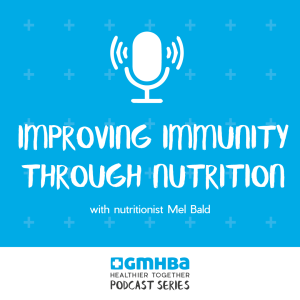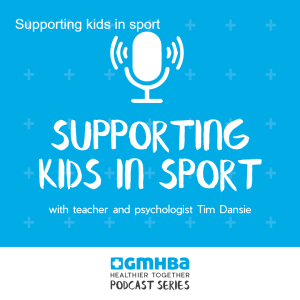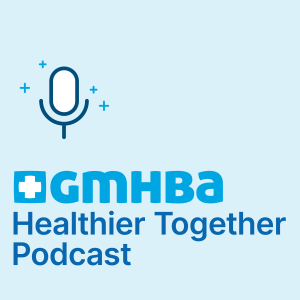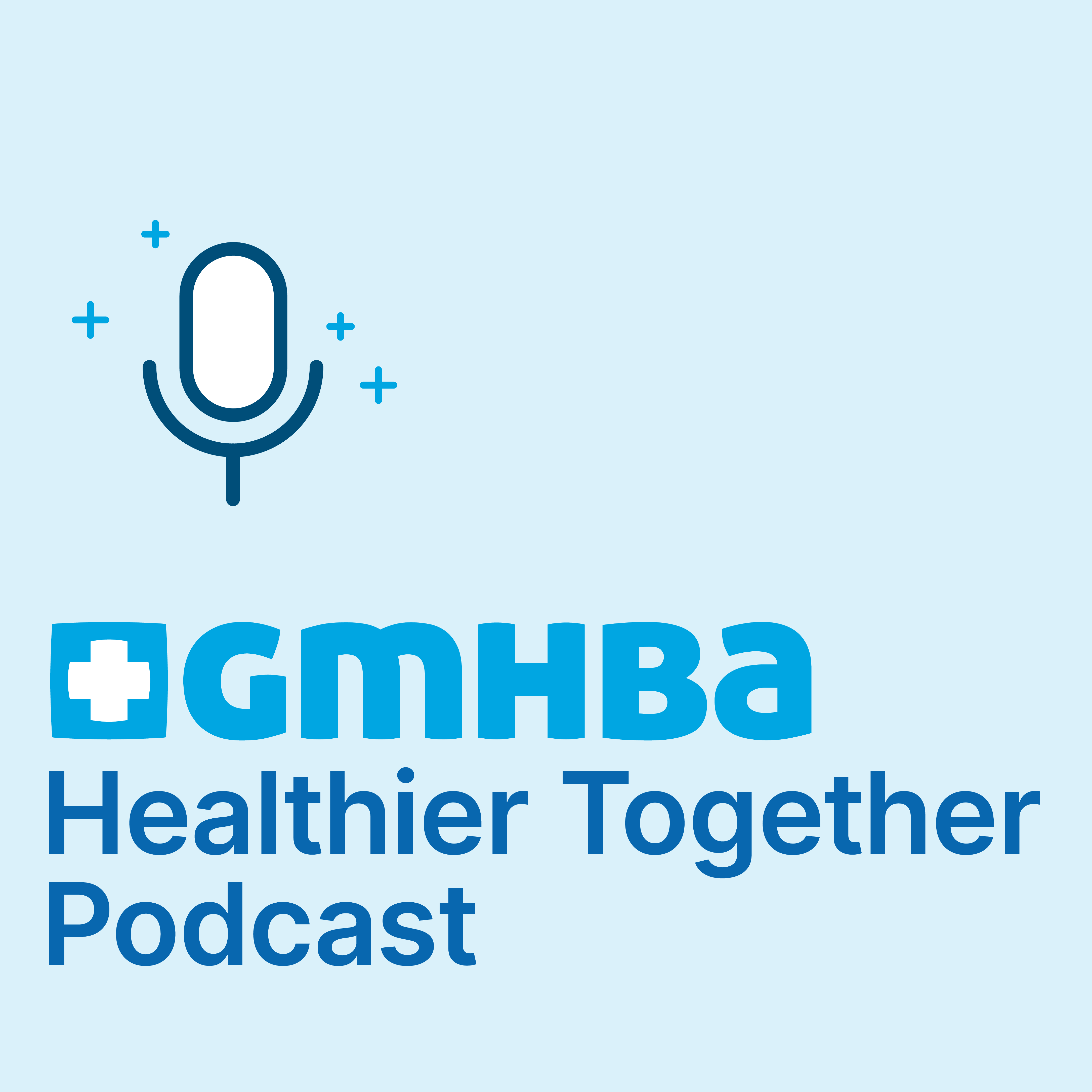Episodes

Thursday Aug 25, 2022
Improving immunity with nutrition
Thursday Aug 25, 2022
Thursday Aug 25, 2022
The immune system is our body’s way of protecting us against infection disease. In our latest Healthier Together podcast, we speak with Mel Bald about how we can support our body through what we eat to have the best defense against germs.

Tuesday Aug 23, 2022
Supporting kids in sport
Tuesday Aug 23, 2022
Tuesday Aug 23, 2022
Kids sport isn’t just about cold weekends and participation medals. Sport teaches lifelong lessons about motivation, winning, losing and creates connections in the community. Presenting ‘Supporting Kids in Sport’ podcast with registered teacher and Psychologist Tim Dansie.

Monday May 23, 2022
5 habit hacks to help you eat better
Monday May 23, 2022
Monday May 23, 2022
Did you know that around half of our behaviour is habitual? Most people know what they need to do to live healthier lives, but ingrained habits often get in the way. Luckily, it’s never too late to do things differently.
Listen as Nutritionist Mel Bald takes us through 5 ways to hack your habits and finally make that change you’ve been thinking about.

Monday Nov 02, 2020
Monday Nov 02, 2020
Dr Sarah White was appointed Director of Quit Victoria in 2014 and is the leading national spokesperson for tobacco control. Dr White oversees the delivery of the Victorian Quitline, which is renowned for its development of new service and technology delivery models for smoking cessation (telephone) counselling. Other key areas of expertise include smoking cessation practice change models in health system settings, and the impact of smoking on health, particularly for priority populations, such as people with mental illness or substance use disorders.
Dr White has a strong track record in policy development, public advocacy and government relations, and extensive experience in communicating research and media relations.
(1.06) How nicotine addiction works
(2.17) How does someone know if they’re addicted?
(3.22) Factors involved in smoking addiction
(4.37) Dealing with smoking triggers
(5.39) Social situations
(6.53) Why a smoking diary is useful
(8.01) Factors which can influence success
(9.43) Increasing chances of quitting
(10.32) Should you quit abruptly or slowly?
(12.03) Role of medications and nicotine replacements
(13.07) What types are available?
(14.28) Nicotine replacement therapy addiction
(15.11) Accessing nicotine replacement therapy
(16.01) What to expect from the Quitline
(17.24) Other resource suggestions
Useful Resources
QUIT www.quit.org.au
Quitline #13 78 48
At the time of publication, GMHBA have provided current, evidence-based information, however information contained in these podcasts should not be relied on as a substitute for professional medical advice. Views expressed in this podcast are not necessarily the view of GMHBA and we make no representation regarding the quality, accuracy or completeness of the information. GMHBA is not liable for any loss or damage suffered arising out of the reliance on the information, text, photos or advertisements used in this podcast, except that which cannot be excluded by law. All materials appearing in GMHBA’s Healthier Together podcast is copyright.

Wednesday Oct 21, 2020
The impact of physical fitness on the mental health of young people
Wednesday Oct 21, 2020
Wednesday Oct 21, 2020
Raigan Howard has spent 10 years as a professional youth worker in the Geelong region, specialising in high challenge activities and leadership development. After working for the City of Greater Geelong Youth Development Unit and partnering with many local schools, Raigan is a fully qualified personal trainer and launched Hello Hurricane with a passion to see young people empowered through effective development approaches. He is in the Army Reserve and recently returned from operation COVID19 Assist in Melbourne CBD and also operation BUSHFIRE Assist in January this year. He is married with 2 children, and resides in Geelong.
(0.56) How did you get to be in the field you work in today?
(2.39) What does the business “Hello Hurricane” entail?
(4.00) How the program differs to existing social work methods
(5.43) How physical activity increases a young persons cability
(8.25) Are some forms of physical activity that are more beneficial to mental health than others?
(11.12) Biggest areas of difficulty young people are currently facing
(15.00) Skillsets required for young people
(18.30) Barriers for young men who want to seek help
(21.59) Signs of depression in young men
(24.45) Changes which occur throughout the program
(30.00) Tips on supporting teens through their years
(34.16) Challenges of running a not for profit business
(39.16) Next steps for the program
(41.15) Where to find more on the programs
Useful Links
http://www.hellohurricane.org/
https://www.instagram.com/hellohurricanefoundation/
At the time of publication, GMHBA have provided current, evidence-based information, however information contained in these podcasts should not be relied on as a substitute for professional medical advice. Views expressed in this podcast are not necessarily the view of GMHBA and we make no representation regarding the quality, accuracy or completeness of the information. GMHBA is not liable for any loss or damage suffered arising out of the reliance on the information, text, photos or advertisements used in this podcast, except that which cannot be excluded by law. All materials appearing in GMHBA’s Healthier Together podcast is copyright.

Thursday Sep 10, 2020
Physio tips on how to improve your running
Thursday Sep 10, 2020
Thursday Sep 10, 2020
Listen in to Andy Chalmers, from Geelong Physiotherapy, for physio tips on how to improve your running. In this episode we explore the biomechanics of running to see how by manipulating these, we can achieve injury prevention, injury rehabilitation and improve running performance.
Andy Chalmers is from Geelong Physiotherapy and graduated from La Trobe University with a Bachelor of Applied Science/Masters of Physiotherapy Practice. He currently works at the Western Bulldogs as a sports trainer, as well as head physiotherapist for the North Geelong Warriors (NPL). Andy has a particular interest in musculoskeletal injuries as well as orthopaedic rehabilitation, although he enjoys treating patients from all walks of life. He treats patients with a combination of manual therapy and exercise rehabilitation, in which he is a qualified Australian Strength & Conditioning Association (ASCA) level 1 coach.
(0.56) What does the biomechanics of running mean?
(2.03) How running biomechanics can be manipulated for injury rehabilitation
(2.48) How to improve your running technique
(4.16) Technique for running down hill
(5.08) Warming up before running
(6.51) How to cool down
(7.42) Tracking your training
(9.31) Running frequency
(10.37) Increasing speed and distance
(12.00) Strength training and running
(13.17) Common running injuries
(14.11) Preventing injuries
(15.09) Why you might need to see a physio
(15.59) What to consider when purchasing running shoes
(18.18) Resources on running
Useful Links
Running Physio https://www.running-physio.com/
At the time of publication, GMHBA have provided current, evidence-based information, however information contained in these podcasts should not be relied on as a substitute for professional medical advice. Views expressed in this podcast are not necessarily the view of GMHBA and we make no representation regarding the quality, accuracy or completeness of the information. GMHBA is not liable for any loss or damage suffered arising out of the reliance on the information, text, photos or advertisements used in this podcast, except that which cannot be excluded by law. All materials appearing in GMHBA’s Healthier Together podcast is copyright.

Tuesday Aug 04, 2020
Meal planning and shopping on a budget
Tuesday Aug 04, 2020
Tuesday Aug 04, 2020
Join us and Alison McAleese, an experienced dietician specialising in public health and obesity prevention, on how to best prepare yourself for the week ahead by meal planning.
Planning meals out on a weekly basis can determine if you're consuming enough variety, a good range of nutrients and can help reduce waste. Listen in to hear Alison’s tips on how to incorporate meal planning for a healthier, more economical and sustainable lifestyle
Alison McAleese is an experienced dietitian specialising in public health and obesity prevention. She also has a keen interest in reducing inequalities related to food nutrition. Over the past 12 years she has worked in community nutrition education, project development and public health roles in Australia and the UK. For the past 6 years Alison has been the Healthy Lifestyles Campaigns Manager at Cancer Council Victoria.
(0.39) What is meal planning?
(1.00) Benefits of planning your meals
(1.27) Key things to think about when planning meals
(2.17) Benefits to shopping less frequently
(2.53) Foods to buy and how to plan
(4.07) How to replace ingredients
(5.05) Keeping shopping healthy
(5.55) Where to find recipes
(6.23) How to start out
Useful Resouces
Live Lighter https://livelighter.com.au/
Better Health Channel https://www.betterhealth.vic.gov.au/
Nutrition Australia https://www.nutritionaustralia.org/
At the time of publication, GMHBA have provided current, evidence-based information, however information contained in these podcasts should not be relied on as a substitute for professional medical advice. Views expressed in this podcast are not necessarily the view of GMHBA and we make no representation regarding the quality, accuracy or completeness of the information. GMHBA is not liable for any loss or damage suffered arising out of the reliance on the information, text, photos or advertisements used in this podcast, except that which cannot be excluded by law. All materials appearing in GMHBA’s Healthier Together podcast is copyright.

Wednesday Jul 15, 2020
Mental Health Matters: Anxiety and depression in ourselves and others
Wednesday Jul 15, 2020
Wednesday Jul 15, 2020
Lorelle Zemunika, a Senior Trainer at Mental Health Victoria, guides us through the challenges of anxiety and depression and advises us on tips to help manage our mental health. Find out more about what resources are available to those suffering and as support persons.
Lorelle Zemunik is from Mental Health Victoria who is the peak body for mental health service providers in Victoria. Their vision is to ensure that those living with mental illness can access effective and appropriate treatment, along with community support.
Lorelle has an extensive background in case management in community and clinical mental health services. She is a Senior Trainer at Mental Health Victoria and uses her lived experience of mental health in peer support, consultancy, and consumer research and training.
(0.55) Overview of anxiety and depression
(1.46) How common are anxiety and depression?
(2.10) Those most at risk for developing anxiety and depression
(2.30) How anxiety manifests
(3.00) Common behaviours that occur with anxiety or depression
(3.52) Anxiety and other symptoms
(4.36) Top tips for those with anxiety or depression
(5.38) Signs to indicate anxiety or depression
(6.40) Key actions for support people
(7.38) Triggers for anxiety or depression
(9.26) Grounding strategies
(11.10) Tips to switch off the brain to help sleep
(12.51) When to seek help
(13.43) Caring for our wellbeing
(16.29) Other resources
Useful Links
Headspace https://www.headspace.com/
Beyond Blue https://www.beyondblue.org.au/
Sane Australia https://www.sane.org/
Black Dog Institute https://www.blackdoginstitute.org.au/
At the time of publication, GMHBA have provided current, evidence-based information, however information contained in these podcasts should not be relied on as a substitute for professional medical advice. Views expressed in this podcast are not necessarily the view of GMHBA and we make no representation regarding the quality, accuracy or completeness of the information. GMHBA is not liable for any loss or damage suffered arising out of the reliance on the information, text, photos or advertisements used in this podcast, except that which cannot be excluded by law. All materials appearing in GMHBA’s Healthier Together podcast is copyright.

Monday Jun 15, 2020
Sleep disorders – what are they & treatment options
Monday Jun 15, 2020
Monday Jun 15, 2020
We all want a bit more shuteye and more restorative sleep. Dr Andrew Bradbeer, lead physician and medical director at Sleep Health Group, tells us what’s normal, what’s not and how our behaviours impact sleep.
Dr Andrew Bradbeer is the lead physician and medical director at Sleep Health Group, working as a specialist in respiratory and sleep medicine in Western Victoria, and the South East of South Australia since 2004. He also supervises a network of sleep centres and home sleep testing locations throughout the region.
His clinical interests range from Acute respiratory disorders such as Asthma, Lung Cancer and COPD to all aspects of Sleep Medicine.
This interview took place over the phone with Andrew so the sound quality may be a little different to previous podcasts but enables us to bring you some amazing guest speakers.
(0.45) What is considered as “normal” sleep
(2.22) How common are sleep problems?
(3.10) Common causes of sleep problems
(3.41) Behaviours that impact sleep
(4.13) When to seek help
(5.21) Snoring – factors affecting it
(6.57) Sleep apnoea – what is it?
(8.35) Treatments for obstructive sleep apnoea and when to seek help
(10.25) Who is more likely to have obstructive sleep apnoea?
(11.51) Insomnia explanation and symptoms
(13.44) Treatments for insomnia
(16.33) Impact of exercise and nutrition on insomnia
(16.59) Sleep studies – what they are and why someone would have one
(19.11) Where to find more information
Useful Links
Sleep Health Group www.sleephealthgroup.com.au
National Sleep Foundation https://www.sleepfoundation.org/
At the time of publication, GMHBA have provided current, evidence-based information, however information contained in these podcasts should not be relied on as a substitute for professional medical advice. Views expressed in this podcast are not necessarily the view of GMHBA and we make no representation regarding the quality, accuracy or completeness of the information. GMHBA is not liable for any loss or damage suffered arising out of the reliance on the information, text, photos or advertisements used in this podcast, except that which cannot be excluded by law. All materials appearing in GMHBA’s Healthier Together podcast is copyright.

Tuesday May 05, 2020
The Importance of Eating Seasonally
Tuesday May 05, 2020
Tuesday May 05, 2020
Dietician, Alison McAleese, who specialises in public health and obesity prevention, guides us on the importance of eating seasonally. Not only does this contribute to our health, but helps the planet and our wallets as well!
Alison McAleese is an experienced dietitian specialising in public health and obesity prevention. She also has a keen interest in reducing inequalities related to food nutrition. Over the past 12 years she has worked in community nutrition education, project development and public health roles in Australia and the UK. For the past 6 years Alison has been the Healthy Lifestyles Campaigns Manager at Cancer Council Victoria.
(0.49) What does seasonal eating mean?
(1.14) How eating seasonally contributes to health
(2.05) Environmental benefits of eating seasonally
(3.01) Your budget and eating seasonally
(3.34) Should I choose eating seasonally or eating organic?
(4.29) Tips on how to make seasonal eating easier
(5.24) Where you can find seasonal local produce
(5.45) Vegetables in season now
(6.52) Where to find out more
Useful Links
Live Lighter https://livelighter.com.au/
Better Health Channel https://www.betterhealth.vic.gov.au/
Nutrition Australia https://www.nutritionaustralia.org/
At the time of publication, GMHBA have provided current, evidence-based information, however information contained in these podcasts should not be relied on as a substitute for professional medical advice. Views expressed in this podcast are not necessarily the view of GMHBA and we make no representation regarding the quality, accuracy or completeness of the information. GMHBA is not liable for any loss or damage suffered arising out of the reliance on the information, text, photos or advertisements used in this podcast, except that which cannot be excluded by law. All materials appearing in GMHBA’s Healthier Together podcast is copyright.

